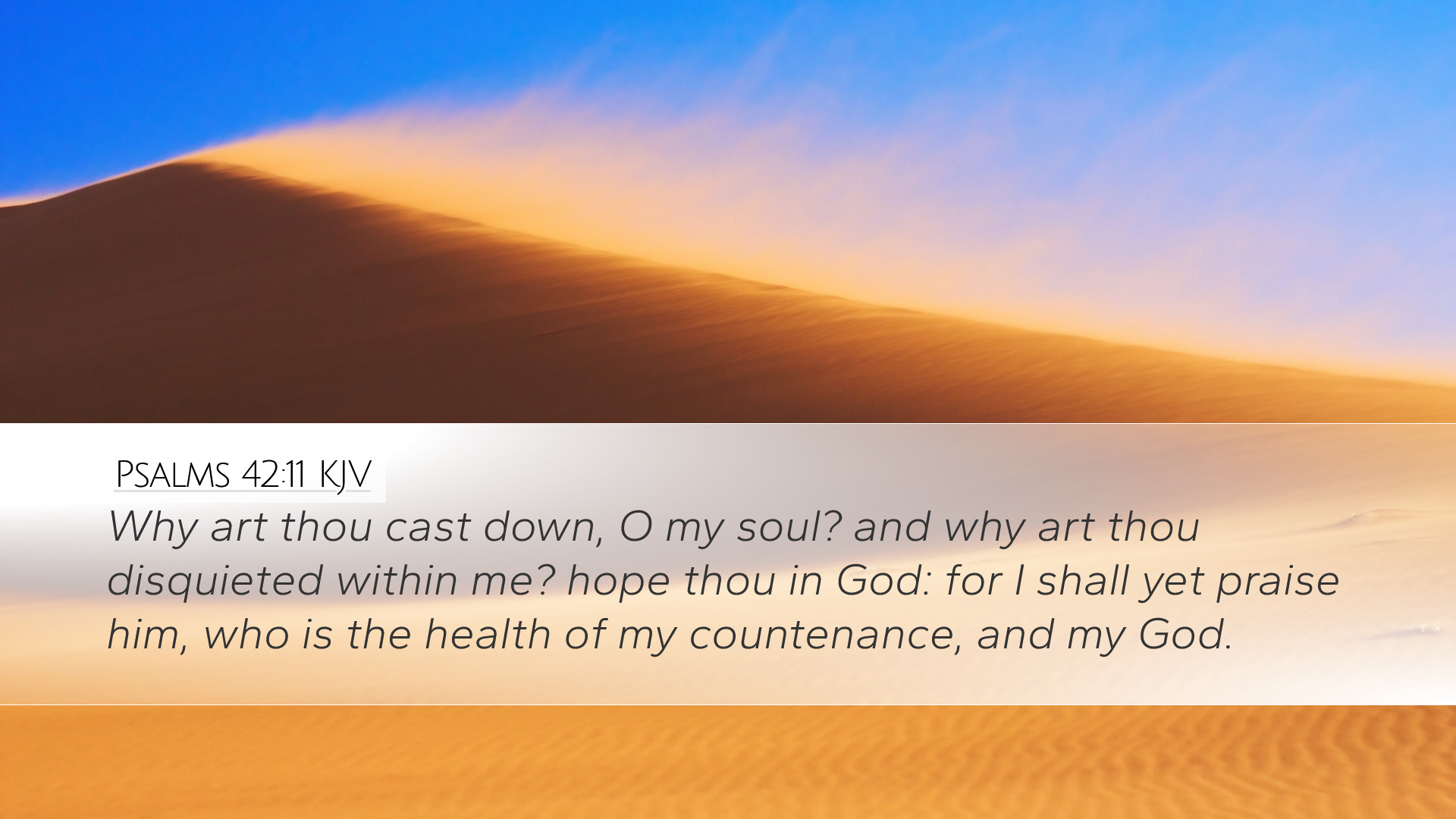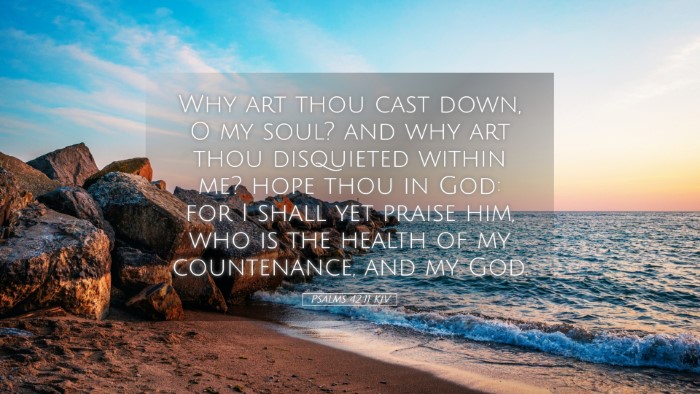Commentary on Psalms 42:11
Bible Verse: "Why, my soul, are you downcast? Why so disturbed within me? Put your hope in God, for I will yet praise him, my Savior and my God." (Psalm 42:11, NIV)
Introduction
This profound verse from Psalm 42 reflects a deep introspection and a dialogue with one’s own soul. The psalmist expresses feelings of despair and disturbance yet chooses to place hope in God. This commentary distills insights from public domain commentaries, shedding light on its theological significance, practical application, and the emotional landscape conveyed in these words.
Textual Analysis
The verse opens with a question that reveals an inner turmoil: “Why, my soul, are you downcast?” This interrogation suggests a conversation between the psalmist's spirit and the external circumstances surrounding him.
- Emotional Struggle: The phrase “downcast” indicates a state of being cast down or depressed. The psalmist acknowledges his emotional plight, which is crucial in understanding his journey toward hope.
- Self-examination: The act of questioning his spirit illustrates an introspective nature, where the psalmist is actively engaging with his feelings rather than succumbing to them.
Theological Insights
Verse 11 encapsulates a key theological theme of hope. The psalmist transitions from despair to hope, indicating a deep-rooted faith in God. Commentators like Matthew Henry emphasize the nature of hope as an active, conscious choice to await God’s intervention.
- Divine Trust: “Put your hope in God.” This command underscores the psalmist’s understanding that hope is rooted in the divine character of God—His promises, faithfulness, and love.
- Praise as a Response: The latter part of the verse, “for I will yet praise him,” signifies a forward-looking faith that transcends present circumstances. The act of praising God in times of trouble is highlighted by Albert Barnes as a spiritual discipline that reflects true trust in God's sovereignty.
Historical Context
Understanding the historical context enriches the interpretation of this verse. Traditionally attributed to David during a time of personal crisis, this Psalm resonates with anyone undergoing spiritual or emotional rejection. Adam Clarke remarks that such circumstances often prompt deeper reflection on reliance upon God.
- Desiring God’s Presence: The opening verses of this Psalm express a longing for God's presence, comparable to a deer panting for water. This imagery reflects an acute awareness of spiritual thirst, setting the stage for the psalmist's questioning and despair.
- Collective Lament: Many scholars believe this psalm could represent the collective lament of the Jewish people during exile, emphasizing the communal nature of suffering and the shared imperative to maintain hope.
Practical Applications
For pastors, students, and theologians, Psalm 42:11 serves as a poignant reminder of how to navigate spiritual despondency. The psalmist's journey from despair to hope exemplifies crucial elements of response during times of trial.
- Encouragement to Others: Pastors can draw from this text to encourage congregants who may be facing similar discouragement, as it affirms that even the most faithful wrestle with their emotions.
- Affirmation of Hope: This verse challenges believers to acknowledge their pain while simultaneously placing their hope in God. The duality of despair and praise illustrates the complexity of human experience in faith.
- Prayer and Worship: The act of prayer, as a form of self-dialogue, encourages believers to articulate their struggles while also cultivating a heart of worship, as seen in the psalmist’s resolution to praise God despite circumstances.
Conclusion
Psalms 42:11 encapsulates a universal human experience—struggling with feelings of despair while striving to maintain faith. The insights provided by public domain commentaries highlight the importance of dialogue with one’s soul and the necessity of placing hope in God. By engaging with this text, pastors, theologians, and students can find strength, encouragement, and a framework for navigating their spiritual journeys. Ultimately, it serves as a powerful reminder that hope in God leads to a renewed spirit, an unyielding faith, and a heart filled with praise.


